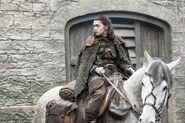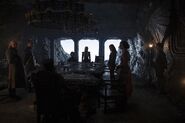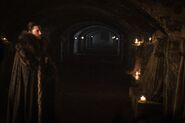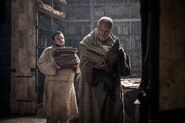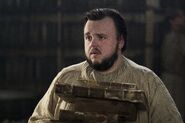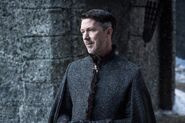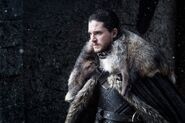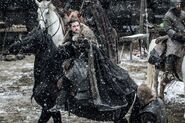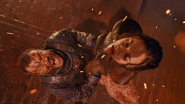"Stormborn" is the second episode of the seventh season of Game of Thrones. It is the sixty-second episode of the series overall. It premiered on July 23, 2017. It was written by Bryan Cogman and directed by Mark Mylod.[1]
Plot
Daenerys receives an unexpected visitor. Jon faces a revolt. Tyrion plans the conquest of Westeros.
Summary
At Dragonstone
During a thunderstorm at Dragonstone, Tyrion Lannister, Varys, and Queen Daenerys Targaryen talk about the stormy circumstances of her birth. Varys briefs her that Queen Cersei Lannister's position on Westeros is tenuous. Tyrion counsels her not to burn the Seven Kingdoms and proposes that she forges alliances with the other houses. Dany then questions Varys about his previous services to her father the Mad King and King Robert Baratheon. Varys confides that King Robert had little interest in ruling.
Dany then confronts Varys about his role in hiring the assassins to target her. Dany distrusts him due to his track record of switching allegiances. Refusing to be intimidated, Varys points out that the incompetent rulers do not deserve blind loyalty, then recounts his lowly origins as a castrated slave and tells her that his true loyalty lies with the oppressed masses. Varys tells Daenerys that if all she wants from him is blind loyalty, she may as well have him killed, but he is much more useful to her and to the Realm alive, and that he believes she is the last hope for the people. Dany accepts his fealty on the condition that he does not conspire against her. She makes him promise to tell her when she is wrong. Daenerys also warns Varys that if he betrays her, she will burn him alive.
Daenerys is then visited by the Red Priestess Melisandre, who believes that Dany might be The Prince That Was Promised. Varys questions Melisandre about her previous service to the ill-fated King Stannis Baratheon. While Daenerys initially does not believe that she was the Prince, Missandei reassures her that the High Valyrian word for prince or princess is gender neutral. Melisandre tells Daenerys that she brings tidings of Jon Snow, the King in the North who has united the North and the Wildlings. Tyrion vouches for Jon Snow and convinces Daenerys that he will make a good ally. Dany accepts Tyrion's advice but stresses that Jon must "bend the knee."
In the Chamber of the Painted Table, Yara Greyjoy and Ellaria Sand firmly advocate an assault on King's Landing immediately. Tyrion advises against laying waste to the Kingdoms' capital and causing the deaths of tens of thousands of innocents, and when Ellaria belittles him for his lack of knowledge in war, Tyrion openly accuses her of poisoning his niece Myrcella Baratheon; Ellaria does not deny it, and expresses regret that her lover Oberyn Martell died for the cause of Tyrion's freedom. Daenerys ends the argument with a rebuke for Ellaria to respect her Hand. Back to the matter of the invasion, Daenerys insists she doesn't wish to be known as the Queen of the Ashes, to which Olenna Tyrell sarcastically ponders if Daenerys will take the Iron Throne by asking politely, and reminds her of the fate of her granddaughter, Queen Margaery Tyrell, who was killed when Cersei blew up the Great Sept of Baelor.
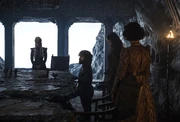
Daenerys has Tyrion discuss their plan of attack.
Tyrion proposes using a combination of Tyrell and Dornish forces to lay siege to King's Landing, much to the chagrin of Olenna and Ellaria, who balk at the thought of using their own soldiers. Tyrion however insists that using the Unsullied and Dothraki would arouse the patriotism of Westerosi bannermen, who would see them as foreign invaders and potentially close ranks behind Cersei. He proposes sending Grey Worm and the Unsullied to take Casterly Rock instead, cutting off Cersei's retreat and dealing a massive blow to the morale of the Western army. The Greyjoy fleet, meanwhile, will escort Ellaria back to Sunspear to rally the Dornish forces and then ferry them up the coast to King's Landing, bypassing the Stormlands and allowing the siege to commence early. Daenerys accepts Tyrion's proposal and reminds the others on her council that she will not be attacking King's Landing, and requests consenting approval from everyone, to which they affirm.
Daenerys dismisses everyone, except Lady Olenna. The Dragon Queen tells Olenna she is aware that her motives are based on revenge and not out of love for her. She insists that she will usher in an era of peace. Olenna, however, reflects that there was never a lasting peace under the Mad King or any preceding Targaryen for that matter. She tells Daenerys that Tyrion is a clever man and that Olenna has outlasted many clever men by not listening to their advice. She tells Daenerys that the lords of Westeros are sheep, yet Daenerys is a dragon and she must be one if she is to rule Westeros.
Later, Missandei visits Grey Worm to bid him farewell before his departure to Casterly Rock. Grey Worm confides that Missandei is his weakness and tells her that the Good Masters of Astapor tortured the Unsullied by exposing them to their worst fears (i.e if the young boy were afraid of drowning he'd be thrown into the sea and if he drown it would be "good" and if he survived it would be "good" because only the fit survive). Grey Worm recalls that he was never the biggest/fastest/strongest but he was the most fearless warrior, until he met Missandei. She replies that she also has to deal with fear and kisses him. Missandei strips naked and proceeds to undress Grey Worm. Grey Worm is reluctant to remove his trousers (presumably not wanting to horrify her with his castration scars) but eventually acquiesces to Missandei's wishes. The two of them then share an intimate sexual encounter.
In King's Landing
In the throne room of the Red Keep, Queen Cersei Lannister gives a speech urging several nobles from the Reach including Lord Randyll Tarly to reaffirm their allegiance to the Iron Throne. Cersei warns that Daenerys' Dothraki hordes would pillage their lands and homes, and rape their women. When Lord Tarly points out that Daenerys has three dragons, Maester Qyburn replies that he is working on it.
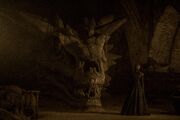
Cersei lays eyes upon a skull of a dead dragon.
Following the audience with Queen Cersei, Lord Tarly meets in private with Jaime Lannister, who confides that he knows not to cross Cersei despite despising her. Jaime wants to appoint him as his general but Tarly is unwilling to break his fealty to Lady Olenna Tyrell. Randyll is wary of the Lannisters. Jaime admits that he dislikes his sister but convinces Tarly that Cersei is the lesser evil against Daenerys and her Dothraki.
Later, Qyburn leads Cersei to the skulls of the dragon beneath the Red Keep. He tells Cersei that his spies have reported that one of Daenerys' dragons was wounded by a spear at Meereen, showing that the dragons are not impregnable. Qyburn then displays a ballista and reassures her that they can hurt dragons. Cersei tests the ballista on the nearby skull of Balerion the Black Dread (the dragon of Aegon the Conqueror) and is pleased when the bolt pierces through the massive, hard skull.
In the North
At Winterfell, Jon Snow, Sansa Stark and Davos Seaworth discuss Tyrion's letter that they have received. While Sansa suspects it might be a trap, Jon doesn't think so due to Tyrion ending the letter with the line "all dwarfs are bastards in their fathers' eyes", which Tyrion has told Jon in their first meeting years ago. Even so, Jon agrees that now is not the right time to go to Dragonstone. Davos opines that Dany will make a good ally in the war to come against the White Walkers.
Some days later, Maester Wolkan brings Jon Snow a message from Samwell Tarly in the Citadel. Jon gathers the Northern lords in the main hall room and announces that Sam's letter reveals there is a vein of dragon glass beneath Dragonstone. He adds that Lord Tyrion has invited him to Dragonstone to meet with Queen Daenerys and announces his decision to travel to Dragonstone to convince Daenerys to join their fight against the White Walkers, declaring that he plans to travel with Davos to White Harbor and sail to Dragonstone island. Lords Yohn Royce and Robett Glover opine that a Targaryen cannot be trusted. Lady Lyanna Mormont urges the King in the North to stay at home. Jon accepts that he is taking a risk but stresses that the fight against the White Walkers is more important and they need Daenerys' aid if the North is to be saved. Jon emphasizes that the North is his home, it is part of him, and he will never stop fighting for it. Sansa reiterates her objection to Jon's leaving and Jon tells Sansa that he is appointing her as ruler of the North in his absence as she is his sister, regent, and a Stark. Sansa accepts and Brienne of Tarth raises her chin and looks up.
In the catacombs beneath Winterfell, Petyr Baelish meets with Jon Snow and vouches that Tyrion can be trusted. Petyr confides that he loved Jon's step-mother Catelyn Stark. When Jon says that he does not belong down here, Baelish replies that he should be grateful for saving him. When Baelish tells Jon about his love for Sansa, Jon grabs him by the throat and warns him that he will kill him if he approaches his sister again. Jon, Davos, and several horsemen then prepare to ride south to White Harbor while Sansa watches from the castle battlements. Before he leaves, Jon looks at Sansa and they share a farewell moment. Petyr, emerging from the catacombs, gazes lustfully at Sansa.
In the Riverlands
Arya Stark encounters Hot Pie at the Inn at the Crossroads, accosting him to give her some pie and ale. Hot Pie tells her that he has become a seasoned pie-master and Arya mentions that she has had some experience baking two pies, omitting the fact that she served Lothar Frey and Walder Rivers to their father, the late Lord Walder Frey. When Hot Pie asks Arya if the lady knight Brienne of Tarth had found her, Arya gives an affirmative answer. When Hot Pie asks where she is traveling to, Arya replies that she is traveling to King's Landing for the Queen. Hot Pie tells her that Queen Cersei has blown up the Great Sept of Baelor and wonders why she is not heading to Winterfell.
Arya replies that the Boltons occupy the castle but Hot Pie informs her that the Boltons are now dead, killed during the Battle of the Bastards by her half-brother Jon Snow, who has been named King in the North. Arya decides to head north and Hot Pie tells her not to worry about paying for the cost of the meal since she is friend. Hot Pie remarks that Arya is pretty for someone whom he thought was a boy, to which she briskly accepts before leaving him. Arya rides her horse into a frost-covered forest.
Later, as Arya prepares to set up camp in a snowy, forested area to make camp, her horse is startled by several wolves. Before the wolves can attack her, they are silenced by their pack leader, which turns out to be Arya's direwolf Nymeria. Nymeria is initially apprehensive towards Arya but recognizes her former master. Arya tells her direwolf that she is going home and invites her to come with her. However, Nymeria quickly leaves with the pack; indicating that time has made the wolf no longer attached to Arya. Arya watches in sadness and remarks "that's not you", echoing her own sentiment for herself, when her father had plans to see her grow up to be a lady for a lord.
In Oldtown
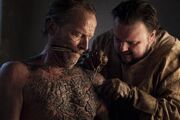
Sam sneaks in and attempts to save Jorah from greyscale.
At the Citadel, Archmaester Ebrose and Samwell Tarly examine Jorah Mormont, whose greyscale has spread to his torso. The Archmaester tells Jorah that he should have cut off his lower arm instead of letting the infection fester. Ebrose opines that Mormont is beyond saving. While it is customary for infected smallfolk to be sent to live with the stone men, Ebrose gives Mormont one more day, implying that the anointed knight could choose to commit suicide instead. When Sam asks about sending condolences to Jorah's family House Mormont, Jorah replies that he is estranged from his family.
Later, the Archmaester lectures Tarly about the art of writing history. Sam refuses to give up on Jorah and mentions that a previous Maester, Pylos, successfully treated two cases of advanced greyscale. Ebrose responds that Pylos contracted the disease and died. Undaunted, Sam decides to treat Jorah and visits his quarters. He tells Jorah that he is not dying today and reveals that he once served under Jorah's father, the late Lord Commander Jeor Mormont. Sam gives Jorah rum to drink, telling him that the process will be painful. Sam also provides Jorah with a mouthguard to muffle his screams. Sam's plan involves using a scalpel to scrape off Jorah's infected skin and then applying ointment. Despite the pain, Jorah consents to the treatment.
On the Narrow Sea
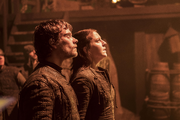
Yara and Ellaria's ships are attacked by Euron.
On the Narrow Sea, Princess Yara Greyjoy and her brother Prince Theon Greyjoy travel aboard their portion of the Iron Fleet with their Dornish allies Ellaria Sand, her daughter Tyene, and Tyene's half-sisters Obara and Nymeria Sand. In their quarters, the Sand Snakes argue about killing Lannisters while lying in bed. Elsewhere, Ellaria drinks Ironborn liquor with Yara and Theon, which she compares unfavorably to Dornish wine. Ellaria asks Yara if she had ever been to Dorne, to which Yara responds that she has been there a few times. Yara and Ellaria begin to sexually flirt with each other. Yara tells Ellaria that Theon will serve as both her bodyguard and adviser. While Yara and Ellaria began kissing, Yara's ship is struck. Entering the deck, they discover that their fleet has been ambushed by their uncle Euron Greyjoy's portion of the Iron Fleet.
Euron's ship extends a boarding ramp onto Yara's ship and lands a boarding party. Yara and her men fight fiercely but are overwhelmed by Euron's warriors. Tyene Sand retreats to below the deck with her mother Ellaria while Obara and Nymeria fight against Euron's Ironborn. Obara fights Euron, who kills her by impaling her with her own spear. Nymeria attacks him with her whip but Euron strangles her to death with it. Though Tyene kills several Ironborn, she and Ellaria are overwhelmed. Ellaria begs the Ironborn to kill them quickly, but they are instead taken captive.
Yara and Euron fight with axes as Yara's fleet burns in the night. Euron captures Yara and then goads "little Theon." Theon is about to come to his sister's aid but panics when Euron's men begin slitting the throats of the wounded sailors and warriors. To Yara's dismay, Theon jumps overboard while Euron laughs with glee. Theon clings to driftwood and sees Obara and Nymeria's corpses impaled on and hanged by the neck from the prow, respectively. Euron's fleet starts sailing towards King's Landing as Yara's fleet burns in the Narrow Sea, while all Theon can do is watch as the ship carrying his sister disappears into the night.
Appearances
- Main: Stormborn/Appearances
First
Deaths
- Obara Sand
- Nymeria Sand
- Many unnamed Ironborn soldiers
Production
Cast
Cast notes
- 17 of 23 starring cast members appear in this episode.
- Starring cast members Jerome Flynn (Bronn), Isaac Hempstead-Wright (Bran Stark), Hannah Murray (Gilly), Kristofer Hivju (Tormund Giantsbane), Rory McCann (Sandor Clegane), and Joe Dempsie (Gendry) are not credited and do not appear in this episode.
Notes
General
- The title refers to Daenerys Targaryen, and how she received her personal sobriquet, "Daenerys Stormborn" (which she has used throughout the series). Right before the rebels arrived at King's Landing at the end of Robert's Rebellion, her pregnant mother was sent to safety on Dragonstone. Her mother went into labor soon afterward, during a massive storm that smashed to pieces what little was left of the Targaryen fleet anchored at Dragonstone, before dying in childbirth. Being born during this ill-omened storm, she earned the nickname "Daenerys Stormborn". The episode itself opens with Tyrion and Daenerys referring to this.
- The Bran Stark and Sandor Clegane storylines do not appear in this episode. The storyline of Daenerys and her various allies shifts into focus, which only briefly began at the end of last episode as a lead-in to this one.
- There are many references to events from past episodes:
- Cersei mentions 4 examples of Daenerys' actions to win support.
- The blind loyalty of the Unsullied, playing to the Westeros opposition to Slavery.
- The Raiding culture of the Dothraki and Daenerys' speech to her Khalasar ("Blood of My Blood").
- Daenerys' crucifixtion of the 163 Great Masters in retaliation for their cruxification of 163 children ("Two Swords", "Oathkeeper").
- Daenerys' execution of the Great Master she had burned alive and fed to Rhaegal and Viserion ("Kill the Boy").
- Randyll Tarly implicitly mentions the destruction of the Great Sept of Baelor (how Cersei treats those who disobey her), the killing of Aerys (oathbreaking and stabbing in the back) and the Red Wedding (Tywin Lannister and the Freys' violation of Guest right).
- Jaime mentions Olenna's obession for revenge ("The Winds of Winter").
- Yara's encounter with a courtesan ("The Broken Man").
- Ramsay Bolton's treatment of Theon as a servant.
- Ellaria's comment about Dornish red wines being the "best in the world" is a reference to the debate between the Dornish red and the Arbor gold.
- Ebrose mentions Ch'Vyalthan, author of "An History of the Great Sieges of Westeros" ("The Prince of Winterfell") and Vaull ("The Watchers on the Wall").
- Daenerys mentions that Illyrio falsely told her brother that the people of Westeros "drink secret toasts to his health" ("Winter Is Coming").
- Daenerys refers to the failed attempt on her life in Vaes Dothrak ("You Win or You Die").
- Varys admits he supported Robert's plan to assassinate Daenerys ("The Wolf and the Lion") (though Tyrion later suspected that Varys intentionally had the plan fail, simply feigning loyalty to Robert).
- Tyrion uses the phrase "all dwarfs are bastards in their father's eyes" in his letter to Jon. Jon recalls that Tyrion told him that before when they first met ("Winter Is Coming").
- Randyl Tarly refers to the battle of Ashford, which was mentioned by Stannis ("Kill the Boy").
- Qyburn refers to young Drogon's injury in the fighting pits of Meereen ("The Dance of Dragons"). The ballista he shows Cersei is a reference to the death of Meraxes.
- Tyrion speaks about the assassination of Myrcella ("Mother's Mercy").
- Arya mentions that she made pies before ("The Winds of Winter"), without being specific about the ingredients (Frey pie).
- Hot Pie tells Arya about meeting Brienne ("Mockingbird")
- Arya tells Hot Pie that she met Brienne ("The Children").
- Hot Pie brings Arya up to speed by informing her of the destruction of the Great Sept of Baelor ("The Winds of Winter") and Battle of the Bastards.
- Jon grabs Littlefinger by the throat, and slams him against a wall, just like Ned did in "Lord Snow" (both for making somewhat creepy verbal advances about a female relative).
- Cersei mentions 4 examples of Daenerys' actions to win support.
- This is one of the few episodes to actually refer to the eastern continent across the Narrow Sea from Westeros by name as "Essos" - only four times in the past six seasons, making this the fifth time. It is called "Essos" by name in both Daenerys's scenes and by Cersei. Essos is a loose fantasy analogue of Eurasia, and indeed is so vast that characters usually refer to a more specific region, such as "the Free Cities" or "the Dothraki Sea". A character saying "I am going to Essos" is loosely similar to someone in real life saying "I am going to Eurasia" - which could refer to anything from Italy to China.
- This episode has a repetition of "Nymeria", as the direwolf Nymeria returns from her disappearance in this episode, whilst the Sand Snake, Nymeria Sand, is killed.
In the North
- Jon's direwolf Ghost does not appear in this episode. Episode writer Bryan Cogman explained via Twitter that a scene between Ghost and Jon was not only scripted but filmed, but cut from the final version of the episode.[2]
- Jon Snow receives a letter from Samwell Tarly in Oldtown about how there is literally a mountain of Dragonglass underneath volcanic Dragonstone island - raising the question of why Davos Seaworth never told Jon about this in the first place. In the preceding episode, Sam even acknowledged that Stannis Baratheon told him there was dragonglass there (back in Season 5). It actually isn't impossible to reconcile all of this: as presented, it seems that Stannis and Davos were aware that loose dragonglass can be found scattered throughout the island, but this specific dragonglass mine deep under the volcano was abandoned and forgotten generations ago. The clearly visible book page Sam was reading, with the map of Dragonstone on it, makes this more explicit: it says that even the Valyrian Freehold, with its continent-spanning empire, judged this to be the largest concentration of dragonglass in the known world - that's why they created a colony there to begin with. Thus, it seems that this ancient Valyrian dragonglass mine was long abandoned, so even Stannis didn't know just how much dragonglass was truly there.
- In the fifth novel, Tyrion muses at one point why the Valyrians only colonized Dragonstone, and didn't try to conquer the rest of Westeros. At the time it was divided into seven divided and constantly feuding kingdoms, which could not have withstood their many dragons and vast armies (Aegon I Targaryen later managed to conquer all of it with only a fraction of their strength). The commonly held view of histories is that they founded it as a trading outpost - but there were plenty of other islands they could have occupied. All of the wealth in Westeros was farther west, in the gold mines of the Westerlands or the rich fields of the Reach - they knew it was there, but just to focus on Dragonstone. This may have been setting up that the Valyrians actually settled Dragonstone specifically to control its vast dragonglass deposits.
- In the crypts, a statue of Eddard Stark has been erected in his memory. Petyr Baelish mentions that he delivered Eddard's remains himself as a gesture of goodwill from Tyrion Lannister, which occurred in Season 2's "Garden of Bones". At the current point in the novels, it is not known if Eddard's remains reached Winterfell, until Season 6's "Battle of the Bastards" confirmed that they did.
- In the books, Ned's bones have not been brought back to Winterfell yet. Lady Dustin, who resents Ned for not bringing her husband's corpse, plans to feed Ned's bones to her dogs as a payback.
- Tension appears to be growing in Winterfell between Jon and Sansa. Given that Sansa was able to save Jon and the Stark loyalist army from Ramsay Bolton with the Knights of the Vale, it is implied in "Dragonstone" that she expects more credit and a say in Jon's decisions, leading to a heated argument between the two which is interrupted by Maester Wolkan. Jon and Sansa disagree in this episode again, when Jon claims he will ride to Dragonstone and meet with Daenerys Targaryen in order to form an alliance against the Night King and to gain access to the dragonglass beneath the island; Sansa, Yohn Royce and Lyanna Mormont cite the crimes that Daenerys's father, Aerys II Targaryen the Mad King, committed against House Stark, especially the burning of Rickard Stark, citing that Daenerys cannot be trusted. Though Jon is aware of this, he reasons that they need Daenerys's help against both Cersei and the Night King, and leaves the North in Sansa's hands, which appears to set the stage for a conflict between Jon and Sansa, especially with Baelish present.
- Jon's harshness towards Littlefinger is left unexplained; it is currently unknown whether or not he knows the role Littlefinger played in Eddard Stark's arrest (which subsequently resulted in his death, though Littlefinger had no direct part in Eddard's death). Littlefinger makes it clear that he loves Sansa, but adds "as I loved her mother", likely giving Jon the impression that he harbors (unrequited) lustful feelings towards Sansa, and prompting him to threaten Littlefinger with death if he touches Sansa. Another explanation is that Jon simply became irritated at Littlefinger for reminding him of Catelyn Stark's coldness towards him, and his motherless childhood.
- Jon's decision to go to Dragonstone himself is questionable: a monarch would normally send an envoy, as Sansa suggested; if the monarch goes himself, it may give the impression that he is lesser than the monarch who invited him. Morever, Jon should have considered that perhaps Daenerys hates his house for supporting Robert against her father (indeed in the books she feels that way). A likely explanation is that Jon, being the only person in the North who has actually seen the Night King and his army (as shown in Season 5's "Hardhome"), believes himself to be the best person to explain the situation to Daenerys as opposed to an envoy who has not seen the Night King, since Eddison Tollett, Tormund Giantsbane, Bran Stark, Meera Reed and the surviving Night's Watch and wildlings are now stationed at the Wall.
- Alys Karstark and Ned Umber are visible in the background of the Winterfell council scenes, but have no speaking lines.
In the Riverlands
- Hot Pie returns in this episode, after being absent since Season 4's "Mockingbird", in which he met Brienne of Tarth and Podrick Payne and told them what he knew about Arya Stark. In this episode, Hot Pie asks Arya if Brienne found her; she confirms it, but does not divulge why she did not go with her, as seen in Season 4's "The Children".
- Hot Pie was part of the batch of Night's Watch recruits that Yoren smuggled Arya out of King's Landing with in the Season 1 finale. After escaping Harrenhal with Arya and Gendry in Season 2, then running into the Brotherhood Without Banners, he parted ways with Arya in Season 3, when he found the relative safety of the Inn at the Crossroads, where the owner gave him a job as a cook due to his skill at it (as he was a baker's apprentice). Not being martially skilled, he felt Arya's dangerous journey wasn't really for him. Though he stayed behind, they wished each other well.
- Hot Pie refers to the fact that Arya disguised herself as a boy while she was with the Night's Watch recruits (on Yoren's instruction), as the Watch doesn't take female members. Arya was around 11 going on 12 years old then so she was able to pass for a boy - Hot Pie is a bit hard on himself by saying Arya's too pretty to be mistaken for a boy now, as roughly five or six years of internal story time have passed since then (Arya is around 17 years old at this point).
- This is the first time in the show that someone tells Arya she is pretty. In the books, Arya was never considered pretty, in contrast to her sister. She has always been a tomboy, and never cared how she looked; as a result, she earned derogatory nicknames like "Arya Underfoot" and "Arya Horseface". However, as the novel's go on, characters begin to state that Arya is becoming pretty. This is similar to Lyanna. Eddard even said that Arya looked like Lyanna at her age, and grew up to be very beautiful.
- Similarly, Hot Pie still refers to Arya as "Arry", the boy's name she adopted as part of her disguise. It is the name that Hot Pie knew her by for a long time, though by the time they parted in Season 3 he knew that she was really Arya Stark. Of course, Hot Pie also has a ongoing habit of mixing up names, so continuing to call her "Arry" out of habit fits his character.
- Hot Pie remarks to Arya that like her, he's a survivor, apparently an in-joke at how he has managed to survive all the way from Season 1 to Season 7 - despite not even being a Starring Cast member or important lord, but just a random commoner. Of 19 human characters introduced in Season 1 who are still alive, only three were never promoted to "Starring Cast" on the show: Sweetrobin Aryn, Ilyn Payne, and Hot Pie. Not being as socially important as the other two (who are nobles), there was never any guarantee that Hot Pie would survive from one episode to the next (even less than the Starring cast on Game of Thrones). Despite this, Hot Pie has somehow managed to stay alive for the entire run of the TV series up to now, often due to blind luck, i.e. in Season 2 when he realized that Gregor Clegane was picking prisoners to execute purely at random, but didn't get picked.
- Arya Stark's direwolf Nymeria finally returns after being absent since Season 1's "The Kingsroad". Arya previously ordered Nymeria to flee for her life after she attacked Joffrey Baratheon to defend Arya, in Season 1 episode 2 "The Kingsroad" (making this an absence of exactly 60 episodes). This led to the vindictive Cersei having Sansa's direwolf Lady executed in her place. In the intervening six years, Nymeria grew into a formidable adult direwolf the size of a small horse, and is leading her own pack of common wolves in the Riverlands. Arya also originally had Nymeria flee right before they reached the Inn at the Crossroads, while heading south - in this episode, Arya encounters Nymeria again just north of the Inn, on her way back.
- There are more hints in the novels about Nymeria's survival and activities in the intervening books, which are peppered with sporadic reports that a very large wolf is leading a very large wolf pack in the Riverlands, feasting on the slain after battles and harassing farmsteads. Common wolves fear men and will avoid them whenever possible, but the huge Nymeria has no fear of man and leads her pack on bold attacks for food - catching their targets unprepared, who are used to just having to scare off wolves instead of fighting them outright.
At Dragonstone

Daenerys in Season 7 is dressing in the old Targaryen style that her brother Viserys wore back in Season 1. Note the short cape pinned to one shoulder.
- Daenerys Targaryen becomes aware of Jon Snow for the first time, unaware that he is her nephew by blood, being the son of her older brother, Rhaegar Targaryen, but believing him to be Eddard Stark's bastard son.
- Tyrion Lannister recalls accompanying Jon Snow to the Wall in Season 1's "The Kingsroad", and cites the deaths of Eddard Stark and Robb Stark at the hands of the Lannisters as reasons why Jon will likely ally with Daenerys against Cersei, despite Aerys Targaryen's crimes against House Stark and House Stark's role in the subsequent rebellion against him. Though Daenerys gives the order to summon Jon to Dragonstone to "bend the knee", it is unknown if Jon, as King in the North, will pledge allegiance to her.
- The new costume style that Daenerys shifts to starting in this episode is actually not entirely new to the series - she has switched to the "old Targaryen style" that her brother Viserys was seen wearing back in Season 1 (as sort of a sign that she has embraced her inner Targaryen nature as a conqueror). Costume designer Michele Clapton explained at the time that because Viserys was older than Daenerys when the Targaryens were deposed (he was a child), he still remembers what the fashions at the old Targaryen royal court looked like and dresses in them - thus even though his one costume didn't appear very often, it was meant to be a window into what the old Targaryen style looked like: asymmetric cut, peaked shoulder cuffs that are separate from the undercoat, long form-fitting sleeves, high collar, and a short cape asymmetrically pinned to one shoulder (as Viserys was seen wearing at her wedding to Drogo in the first episode). Finally, of course, she has also dramatically shifted from her prior blue or white color palettes to finally dressing in Targaryen red and black, the colors of their heraldry. For more information, see "Costumes: King's Landing - Under the Targaryens" Daenerys does retain one of her trademark fashion choices from Essos however: she still wears riding breeches under her dress.
- Olenna Tyrell meets Daenerys Targaryen in this episode. Interestingly, Olenna is one of the few characters left alive by this point who is old enough to remember when House Targaryen was originally in power and held the Iron Throne - even the time before the reign of the Mad King, when King Aegon V Targaryen was a good and stable monarch (Aegon V being Maester Aemon's younger brother). Other older characters who might remember those days – Aemon, Tywin Lannister or even Barristan Selmy – are dead by this point in the TV series. Olenna actually mentioned back in Season 4's "Oathkeeper" that in her youth she was originally betrothed to "some Targaryen or other" as it was "all the rage" due their then-stable rule. Of course, not personally wanting the match, she managed to get out of it and married Luthor Tyrell instead. In the books, Olenna was betrothed to one of King Aegon V's sons, but he actually wasn't attracted to her either because he was secretly a homosexual, and ultimately argued with his father as well to have the betrothal called off. Bryan Cogman wrote "Oathkeeper" and highlighted in interviews that he added in that moment of Olenna recalling her Targaryen betrothal as a way to work the history of the Targaryens into the live-action TV show (which can't have extended descriptions of the past as easily as books can), and Cogman is also writing this episode.
- Daenerys being unaware of the fact that the High Valyrian word for "prince" is gender-neutral indicates her Valyrian may no be so excellent as perceived. This is curious, since she had stated in "And Now His Watch Is Ended" that High Valyrian is her mother tongue, and Missandei (who is the best person to ask) stated in "Second Sons" that Daenerys's High Valyrian is excellent. However, in the books, Daenerys more properly speaks several dialects of Low Valyrian and spends a lot of time speaking the Common Tongue and Dothraki (which she is noted to have problems with when not actually amongst Dothraki), so it's possible that she is simply confusing the gender-neutral High Valyrian word for a Low Valyrian derivative that has different linguistic features.
- Tyrion Lannister clearly resents Ellaria Sand for killing Myrcella Baratheon, which occurred in Season 5's "Mother's Mercy", and claims that "we don't poison little girls here", which seems to refer to Oberyn Martell's promise to Cersei that Myrcella would be safe in Dorne ("We don't hurt little girls in Dorne".). Though Tyrion is in a position to demand justice for Myrcella's murder, a likely reason he does not is out of fear that the Dornish will withdraw support if Daenerys kills Ellaria and the Sand Snakes.
- The books make a point that Daenerys hates the Starks for betraying her father. In her eyes, they are no different from the Lannisters, and share the blame for the deaths of her nephew and niece. Ser Barristan Selmy tells her that Ned had tried to dissuade Robert from killing her, but she does not change her mind. It has yet to be seen how she will treat Jon, though her opinion of him seems to imply that she admires him, if only slightly. Besides, since Daenerys has forgiven a Lannister since he was not personally responsible for the death of her kin, she may act the same toward Jon.
- Grey Worm tells about the method the Good Masters used in order to make the slaves get over their fears. It is somewhat similar to the modern psychotherapeutic treatment known as "systematic desensitization" (also "graduated exposure therapy"), but it should be performed by a careful and gradual exposure of the patient to the objects he fears of; it can assumed the Good Masters did not really care whether their method would worsen the slaves' mental condition.
- Daenerys says she will not be "Queen of the Ashes". This is perhaps a reference to the novels: one of the visions Daenerys sees in the House of the Undying is of her father, telling someone (perhaps Rossart) "Let him [Robert] be king over charred bones and cooked meat. Let him be the king of ashes" - referring to the Wildfire Plot.
In King's Landing
- The intention of Qyburn to use a custom-made ballista against Daenerys's dragons appears to be a reference to how the dragon Meraxes died in the First Dornish War. While the Targaryens conquered the rest of the Seven Kingdoms in the War of Conquest, the harsh desert of Dorne proved quite an obstacle. A few years later they returned and captured all of its castles and towns, but the Dornish responded with a brutal guerrilla war. The Targaryens responded by burning any castle which rose against them with dragonfire, but the Dornish armies would flee when the dragons came and return as soon as they left. When Queen Rhaenys Targaryen attacked Hellholt while flying Meraxes, however, the garrison put up a stiff defense, and a very lucky shot with a ballista bolt managed to hit the dragon in the eye mid-flight, piercing into her brain and killing the dragon instantly. Rhaenys apparently died in the fall but her body was never recovered. Meraxes's death was a stunning blow to the Targaryens.
- The TV episode didn't expend exposition on the history of how Meraxes died, given limited time, though this is fully explained in the Season 5 Blu-ray animated featurette "Dorne (Histories & Lore)". Instead, Qyburn cites that Drogon was wounded in the ambush at Daznak's Pit in Meereen as proof that Daenerys's dragons aren't invincible. The writers actually admit in the Blu-ray commentary for that episode that Drogon was able to be wounded with spears in that attack because he was just a juvenile at the time - which is true. Dragons' scales get thicker and harder as they age, until fully adult dragons are practically impervious to swords, spears, or projectiles. There are historical examples of juvenile dragons being injured with human weapons, but the only thing that can pierce an adult dragon's hide is really another dragon. After Meraxes died, subsequent wars involving dragons did shift tactics to try to aim for their eyes with heavy projectiles - but the dragon-riders were very wary of this as well, so they were more careful to make quick bombing-runs on ground targets and evade projectile fire. A major example is the Siege of Rook's Rest during the Dance of the Dragons, when Aegon 's forces did try to shoot the adult dragon Meleys in the eyes, but her rider successfully evaded their fire. Ultimately, no other dragon was ever killed again by shooting it in the eyes. Vermax was also killed by human action in the Dance, though in that case it was a younger dragon and his foes hurled grappling hooks in his path, so he ended up impaling himself with more force than a human weapon ever could.
- It's possible that Qyburn's custom ballista is actually going to be present in the next novel, given how it evokes the details given only in the novels about how Meraxes died: when they practice shooting it, they even aim directly for the eyes of a dragon skull.
- The actual effectiveness of the ballistic is questionable as Qyburn’s test was against a skull that was over 200 years old. Unless the dragon is hit in the head, the wound will not be fatal. In addition, the skull was stationary, whereas Daenerys dragons will not only be moving, but airborne.
- Randyll Tarly, Samwell's father, returns in the episode by travelling to King's Landing. During conversation, Jaime Lannister cites him as the only one who ever defeated Robert Baratheon, during the Battle of Ashford; this was previously mentioned in Season 5's "Kill the Boy" by Stannis Baratheon to Samwell Tarly, after he realizes he is Randyll's son.
- Randyll Tarly is portrayed in the novels in a quite negative light, especially his behavior toward Sam and Brienne. In this episode, though, he proves to be an honorable person: reluctant to break his oath to the Tyrells, and open in expressing his negative opinion about both the Lannisters and the Freys - bluntly referring to the destruction of the Great Sept, the killing of Aerys and the Red Wedding.
- Cersei tells the attending people that the Dothraki will burn their villages, rape their women and butcher their children. What she said was true, as Daenerys herself witnessed, but she "forgot" to mention that those who serve the Lannisters (mainly the Mountain and Amory Lorch) have repeatedly performed exactly the same atrocities.
At Oldtown
- It is unclear why Sam gave Jorah rum as an anesthetic, rather than milk of the poppy, which is commonly used in Westeros for that purpose (it is their version of morphine). Even without any medical background, Sam should have known that. It's possible that he couldn't take any without being noticed, when Ebrose forbid from trying the experimental treatment - though this wouldn't explain how he did manage to acquire all of his surgical tools and ingredients to make the anti-greyscale medical ointment.
- In the books, Samwell was actually by Jeor Mormont's side after he was mortally wounded during the Mutiny at Craster's Keep (in the TV version his attacker just keeps stabbing him until he dies, and a large fight breaks out, so Sam flees). Jeor's last words were to beg Sam to pass on a message to Jorah: "Tell my son. Jorah. Tell him, take the black. My wish. Dying wish". He didn't think Jorah was beyond redemption but wanted him to join the Night's Watch as he should have instead of fleeing into exile.
- In the novels, Archmaester Ebrose is specifically the archmaester of medicine, and he is indeed one of he best medical minds in all of Westeros. Moreover, he is mentioned as authoring several major studies on infectious diseases (including dangerous plagues from other continents, such as the "butterfly fever" from Naath, Missandei's island home).
- Several callbacks are made to previous information given about Greyscale in Season 5: Sam recalls meeting Shireen Baratheon, and how she was cured of greyscale as a baby by Maester Cressen (though it left her face scarred). Ebrose counters by pointing out information also from the books: that greyscale can rarely be cured in infants or children, but not adults, and only if it is treated fairly early - Shireen was a baby and it was treated early, but Jorah is an adult with an advanced case, and thus beyond known treatment. Ebrose also says that Jorah should have cut his arm off to stop the spread (which sometimes works but often doesn't), and the only remaining option (besides suicide) would be to ship Jorah to the ruins of Old Valyria with the stone men. Ebrose also says that greyscale takes years to actually kill someone, leaving them in great pain for perhaps 10 to 20 years. The loose figures given in the novels are around 5 to 10 years, though it is not unheard of for someone to live 20 years with it. The novels only vaguely mention that when the infection grows inwards and starts warping the flesh of the brain, it can drive victims to madness, without giving a time scale for it; in this episode, Ebrose thinks Jorah might have only 6 months at best before he goes crazy from it (and he was infected nearly 2 years before).
- The book that Sam was reading in the preceding episode seemed to hint that the cure for greyscale was to consume powdered Dragonglass - though the maester who wrote it also doubted it would work. It's unclear what Samwell made the medical ointment out of that he used on Jorah.
- The novels note that Greyscale-scarred flesh is hard and deadened, so it doesn't actually feel any pain. After his run in with Stone men while on a boat in the books, Tyrion is told to prick his fingers with a knife everyday to test if he caught greyscale, and he follows that advice: if he started losing sensation in one of them he'd have had to cut it off in hope of stopping its spread. Jorah is in a great deal of pain in this episode - though Sam says he's cutting through the greyscale scars, down to the next layer of still-living flesh, which can still feel pain. "Flaying" might not be an accurate term for what Samwell is doing to Jorah here: that involves peeling back the thing layers of skin, but Samwell is cutting off flesh warped by greyscale, with a scalpel.
- There is no "Archmaester Pylos" in the novels. There is a different character named Pylos, an ordinary-ranking master, who served as the elderly Cressen's assistant at Dragonstone and who was being prepared as his eventual replacement. Of course, there might be more than one person named "Pylos" in all of Westeros. Given that maesters give up their family names when they join the order (those who are from noble families), it's unclear how they distinguish maesters who happen to have the same name (i.e. if there's more than one named "Pate", a common name in Westeros).
- Both of the maesters that Ebrose mentions who wrote history books he judges were mentioned in past episodes, both were invented by the TV series, and both of their descriptions in this episode match their prior descriptions:
- Ebrose remarks that "Archmaester Ch'Vyalthan" wrote very well cited research - to the extent that, while factually accurate, his prose style is very boring and legalistic. This is a call-back to Season 2, when Tyrion was reading Ch'Vyalthan's book, "An History of the Great Sieges of Westeros" and remarking on it to Bronn. Varys then came into the room and noticed what he was reading, and said it was a thrilling subject, but it's a shame that Ch'Vyalthan wasn't a better writer.
- Conversely, Ebrose then remarkes that Maester Vaull had a very entertaining and florid prose style - to the extent that "half" of what he wrote was just made up or editorialization. In Season 4, Samwell actually read one of Vaull's books in the library at Castle Black, talking about the savagery of the wildlings, hyping up that very last one of them is a sadistic cannibal, tortures their victims, etc. Maester Aemon then chided Samwell that Vaull made most of that up, assuring him that the closest Vaull even came to seeing a wildling was the very library they were standing in.
- Samwell says the title of the book Ebrose is working on, An History of the Wars Following the Death of Robert I, could be a bit more "poetic". This may be a callback to Season 4, when Sam asked Jon what having sex with a girl was like (with Ygritte): Jon couldn't give a very good description, then just dropped it by saying he wasn't a poet, if that's what Sam wanted.
- When George R.R. Martin wrote Samwell Tarly, he was partially influenced by Samwise Gamgee from The Lord of the Rings: both are the best friend of the lead character, somewhat overweight, sort of an everyman who isn't originally very brave or a famous warrior, and both are called "Sam" for short. At the end of the story, it is revealed that it is based on an in-universe history book written by the main characters: Bilbo Baggins, then Frodo Baggins, and then after Frodo leaves, Samwise finishes up writing some of the loose ends. Similarly, Game of Thrones might be setting up that Samwell Tarly is going to write an in-universe history book about all of these events in Westeros. This would be consistent with the Archmaester instructing Tarly "about the art of writing history".
- Screencaps reveal the content of Jorah Mormont's suicide note, which he writes in his chamber while eyeing his sword: "Khaleesi, I went to the Citadel in the last hope that the maesters could treat me as you ordered. Even with all [...] I am beyond any cure out the grave. I have had a longer life than I deserved and I only wish I could've lived to see the world you're going to build, standing by your side. I have loved you since the moment I met you. If there's [...] - Jorah"
- The camera cutting from Samwell sawing at Jorah's scaley skin to a bowl of potato stew in Arya's scene was specified in the script, not an invention of the director.[3]
On the Narrow Sea
- Ellaria's comment about Dornish red wines being the "best in the world" is a reference to the debate between the Dornish red and the Arbor gold.
- Ellaria flirting with Yara aboard the Black Wind appears to be a callback to the sixth season where Yara kisses a courtesan in Volantis in front of Theon, making him visibly uncomfortable after his castration by Ramsay Snow. Being bisexual herself, Ellaria invites Theon for a threesome, unaware of what Ramsay did to him. Further, Ellaria treats Theon rather coldly, demanding that he refill her jug; though Yara tells Ellaria that Theon is not their servant, Theon begrudgingly claims he does not mind, possibly due to having served Ramsay as a servant for nearly two years.
- When Ellaria says there is a boy in every port in Dorne, Yara responds with "A boy, a girl. Depends on the port." This implies Yara is bisexual. Yet Gemma Whelan stated in an interview that Yara was gay.[4]
- When the Sand Snakes are discussing who will get to kill whom when they lay siege to King's Landing, Nymeria comments that she wants to kill The Mountain, in revenge for murdering Oberyn.
- In the novels, the Sand Snakes believe that the Mountain is dead. This is not just exclusive to them: in the novels, it is widely believed that Gregor Clegane died of his wounds after his battle with Oberyn, which is part of the Ser Robert Strong identity mystery. In order to appease Dorne, the Mountain's skull was brought to Sunspear by Ser Balon Swann of the Kingsguard, and was presented to Doran Martell, Arianne Martell, and Obara, Tyene and Nymeria Sand. Tyene herself confirms that if the poison her father used so much as broke the Mountain's skin, then Gregor is dead. Obara, however, suspects trickery; she has no idea how much she is close to the truth.
- Euron Greyjoy's proposal of a "gift" for Cersei seems to be explained in this episode. Apparently aware of how Myrcella Baratheon was killed, Euron attacks Yara and Theon's fleet but makes sure to take Ellaria and Tyene Sand prisoner instead of killing them; Ellaria and Tyene were primarily responsible for Myrcella's murder, since Tyene synthesized the poison and Ellaria administered it via a kiss. Euron apparently intends to bring Ellaria and Tyene before Cersei so she can take revenge for Myrcella. Also, Cersei could use Ellaria as a hostage to force Dorne into siding with her against Daenerys, much like how the Mad King used Elia Martell as a hostage during Robert's Rebellion to ensure Dorne's support. The capture of Yara can be used as evidence that Yara has no claim to Salt Throne since Euron followed the Old Way and paid the Iron price according to Ironborn culture. This was a running point in the novels. When Asha was captured by Stannis, she realized that her defeat, combined with her failure at Kingsmoot, meant that the Ironborn would never follow her.
- Of note, Tyrion Lannister brings this up during Daenerys's war council, openly accusing Ellaria of poisoning Myrcella, an innocent girl, in cold blood, until the argument is broken up by Daenerys herself. Following the airing of "The Winds of Winter", it was widely speculated that Tyrion, as Daenerys's hand, would demand justice against Ellaria for murdering his niece; the deaths of Obara and Nymeria and the abduction of Ellaria and Tyene by Euron have made this less than likely.
- In a sense of irony, Obara and Nymeria are killed by Euron Greyjoy, who uses their own weapons against them, impaling Obara through the stomach and pinning her from the ship's bowspirit, and strangling Nymeria to death before hanging her corpse from the ship. Obara literally stabbed Trystane Martell in the back with her spear, while Nymeria appeared with the intention of strangling Trystane with her whip had Obara not interfered. Their cold-blooded murder of Trystane has come full circle with their deaths, since although Euron's motive was clearly not avenging Trystane's death (no more than Jaime's maiming by Locke was meant to be a payback for what he did to Bran), it can considered poetic justice that Obara and Nymeria were killed by the same weapons they used to butcher their own cousin.
In the books
[This section will be updated with comparisons after the sixth novel is released.]
The episode contains influences from the following chapters of A Feast for Crows:
- Chapter 7, Cersei II: A Lannister praises Randyll Tarly for his military background.
- Chapter 35, Samwell IV: Someone reaches the conclusion that Daenerys is the prince that was promised, because the High Valyrian word for "prince" is gender-neutral, as it is derived from the word for "dragon", creatures which have no fixed gender.
The episode contains influences from the following chapters of A Dance with Dragons:
- Chapter 22, Tyrion VI: Tyrion speaks ill about Cersei, and advises someone to invade Westeros. Someone tells false horror stories about Daenerys.
- Chapter 26, The Wayward bride: Asha Greyjoy is defeated and taken captive.
- Chpate 35, Jon VII: Asha's ships are destroyed.
Memorable quotes
Melisandre: "I believe you have a role to play, as does another. The king in the north, Jon Snow."
Olenna Tyrell: "The lords of Westeros are sheep. Are you a sheep? No. You're a dragon. Be a dragon."
Archmaester Ebrose: "What? You don't like the title? What would you call it then?
Samwell Tarly: "Possibly something a bit more poetic?"
Archmaester Ebrose: "We're not poets, Tarly."
Arya Stark: "That's not you."
Ellaria Sand:"Why are you standing all the way over there then? A foreign invasion is underway."
Gallery
See also
References
Template:Episodes navbox


